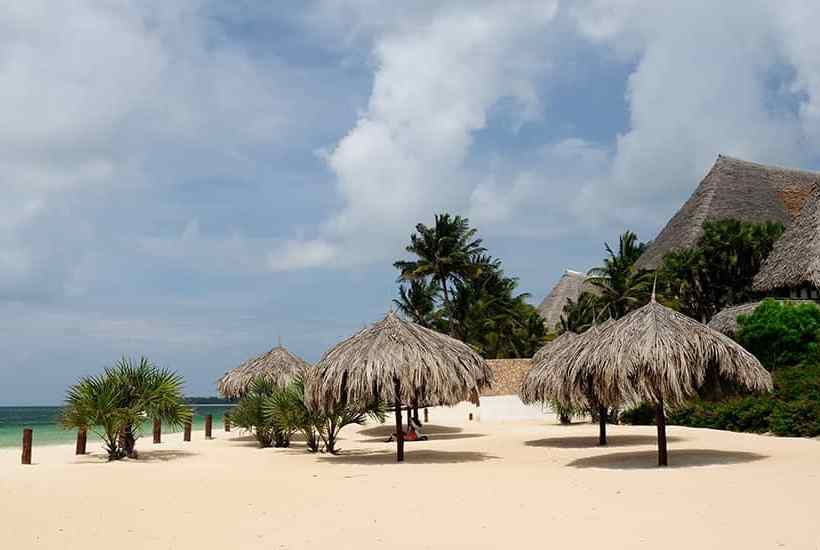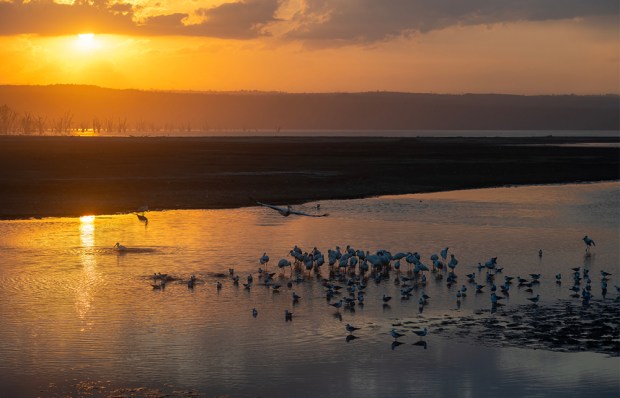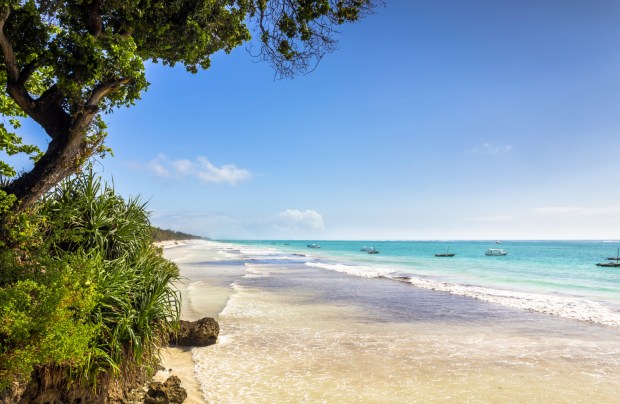Malindi, the Indian Ocean
When I lived in Jerusalem a long time ago, I often visited the Church of the Holy Sepulchre, where the Catholics, the Greeks, the Syrians and Armenians had their separate territories within the sacred complex of Christ’s Calvary, tomb and Resurrection. (The Ethiopian priests were all unfairly banished to the roof.) Every year, one of the denominations would say: ‘The ceiling is blackened by candle smoke — we should clean it.’ And all the other denominations would say: ‘Noooo — this is a terrible idea. It should not be done.’ The next year, another of the denominations would also say: ‘The ceiling is blackened by smoke, let’s clean it.’ Noooo would come the loud answer from everybody — and so the ceiling stayed blackened as the years passed.
This month I realised that St Helena’s sacred church is the model for all family-owned holiday homes, whether they are on a mountain, in Tuscany or on the sea. Since our mother Doreen died a year ago, her four children have done a fine job of renovating the main house of our beach home in Malindi, on Kenya’s very beautiful north coast. This has been mainly thanks to my sister Bryony, who once we all agreed a plan of action while we were still in mourning for our Mum, I think, poured her grief into the bricks and plaster of the wonderful new home we now have on the Indian Ocean. When it was done, generations of the family enjoyed staying in our new, very simple but lovely home on the white coral sands, where turtles nest a few metres from the beds where we sleep listening to the roar and thump of the surf.
But on the triangle of land our parents bought, which goes down to the high water mark, there is still more to be done. Behind the main house is a great edifice our mother built a generation ago as her own domain, away from the main home where we all stayed before she left us. This is known as the Kremlin. It was originally a small, coconut-thatched boat house, but over the years it was built up into an imposing two-storey structure with a flat Arab roof. The Kremlin now appears to be on the verge of total collapse, with huge cracks down the walls and across the places where the village builders should have placed the lintels. And so it needs both rebuilding and modernisation.
A house on Kenya’s ocean front needs repair every year — especially during our relentless kaskazi northern monsoon, which is roaring into my face as I write this looking at the beach right now. In the kaskazi, all metal rusts, corroding hinges and walls that warp and crack. Paint blisters, wood rots, trees and grass burn with salt from the Arabian heat and things fall apart. When the annual tempest subsides, it takes an entire holiday to repair all the damage and make the place inhabitable again.
This is the scene I face this month. At a conference on the shores of Lake Naivasha in early January, our mother’s four ageing children agreed to a number of great improvements to Malindi. We would rebuild the Kremlin in order not only to prevent its collapse, but also to create spaces for future generations of family taking their holidays here. We agreed to construct great coral walls along our land boundaries. A huge tank will be sunk underground in which all the rain from the flat Arab roof will run. Solar panels will be installed to take us off the unreliable grid, the mains electricity that costs us so much to run the house each month. Solar water heaters will be put up on the roof to power the showers we take to wash off the salt. Finally, we might build a swimming pool with a terrace of coral blocks overlooking the beach, so that the youth — or visitors from elsewhere who are frightened of the ocean waves — may loll around sunbathing or drinking cocktails in cool waters.
Inevitably, like the denominations of the Church of the Holy Sepulchre, we are in deadlock. Every single design that I send to my siblings has been described as inadequate. Fresh plans come back to me by email that are totally different. I know that if we do not agree quite soon, the Kremlin will fall — but we will not get to that point. Somehow, probably when my sister Bryony returns to the coast, there will suddenly be agreement and the building will be completed. Until the next kaskazi monsoon.
Got something to add? Join the discussion and comment below.
Get 10 issues for just $10
Subscribe to The Spectator Australia today for the next 10 magazine issues, plus full online access, for just $10.
You might disagree with half of it, but you’ll enjoy reading all of it. Try your first month for free, then just $2 a week for the remainder of your first year.















Comments
Don't miss out
Join the conversation with other Spectator Australia readers. Subscribe to leave a comment.
SUBSCRIBEAlready a subscriber? Log in